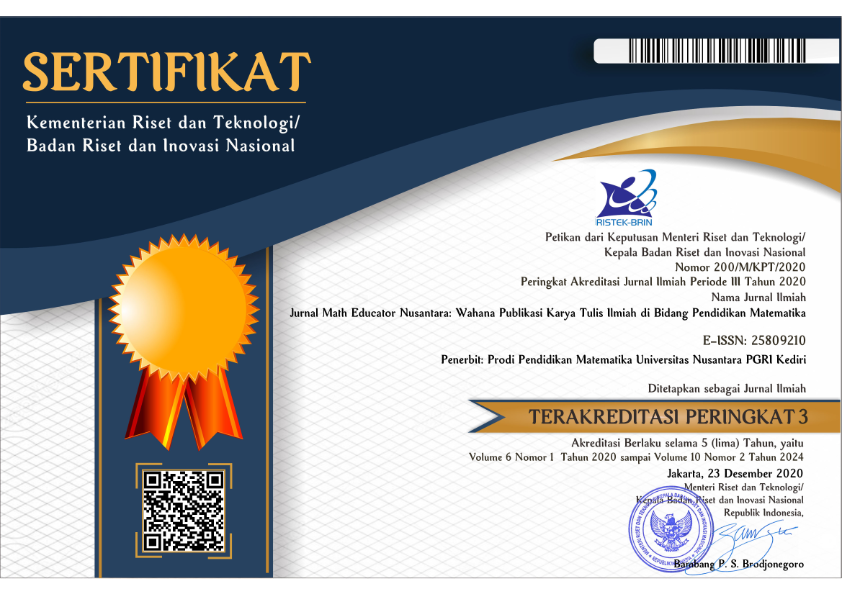Design of supplementary mathematics module for preparation of minimum competency assessment for fifth grade elementary school students
DOI:
https://doi.org/10.29407/jmen.v8i1.17682Keywords:
AKM, Discovery Learning, ModulAbstract
Students' skills in solving numeracy questions in the AKM are still varied, especially for SD Negeri 3 Mendo Barat students. The implementation of AKM, especially numeracy skills, impacts the learning given to students. Students are not only required to understand mathematical concepts but must demonstrate other mathematical abilities such as reasoning and problem-solving abilities. Therefore, teaching materials are needed that can support the AKM-based learning process. At SD Negeri 3 Mendo Barat, there are still very few teaching materials owned by students, especially those based on AKM. This study aims to develop a companion mathematics module for preparing AKM for fifth-grade elementary school students that is valid, practical, and potentially affects learning outcomes. Development research using a 4-D model is used as a research technique. The research subjects were 22 students of class V SD Negeri 3 Mendo Barat, as many as 22 people. The results showed that the mathematics module was valid and practical—valid seen from the experts' assessment of the module. Experts consist of material, media, and language experts. Practicality is obtained from the results of student questionnaire analysis in a limited field test which shows a practicality percentage of 91.32 per cent. Based on the operational field test results, the average final score of students is 87.05, which indicates that student learning outcomes are in the very good category. The module can potentially affect student learning outcomes in the good category.
References
Afgan, J. (2011). Analisis Kurikulum Matematika. Universitas Terbuka.
Arifah, U., & Saefudin, A. aziz. (2017). Menumbuhkambangkan Kemampuan Pemahaman Konsep Matematika dengan Menggunakan Model Pembelajaran Guided Discovery. UNION: Jurnal Ilmiah Pendidikan Matematika, 5(3), 263–272. https://doi.org/10.30738/.v5i3.1251
Arigiyati, T. A., Sulistyowati, F., & Kusmanto, K. (2020). Modul komputasi matematika untuk meningkatkan motivasi mahasiswa. Jurnal Math Educator Nusantara: Wahana Publikasi Karya Tulis Ilmiah Di Bidang Pendidikan Matematika, 6(2), 104–114. https://doi.org/10.29407/jmen.v6i2.14453
Arimurti, I., Praja, E. S., & Muhtarulloh, F. (2019). Desain Modul Berbasis Model Discovery Learning untuk Kemampuan Pemahaman Matematis Siswa. Mosharafa: Jurnal Pendidikan Matematika, 8(3), 459–470. https://doi.org/10.31980/mosharafa.v8i3.459
Burais, L., Ikhsan, M., & Duskri, M. (2016). Peningkatan Kemampuan Penalaran Matematis Siswa melalui Model Discovery Learning. Jurnal Didaktik Matematika, 3(1). https://doi.org/10.24815/jdm.v3i1.4639
Cahyanovianty, A. D., & Wahidin, W. (2021). Analisis Kemampuan Numerasi Peserta Didik Kelas VIII dalam Menyelesaikan Soal Asesmen Kompetensi Minimum. Jurnal Pendidikan Matematika 5 (2).
Damanik, R. U. F., Pasaribu, R. H., Syahputra, D. A., Putra, B. A., Harahap, Z. I., & Surya, E. (2019). Upaya Meningkatkan Kemampuan Penalaran Matematis Siswa Kelas VIII SMPN 23 Medan Melalui Penerapan Model Pembelajaran Discovery Learning. Prosiding SiMantap: Seminar Nasional Matematika Dan Terapan 1, 567–575.
Hasanah, U., & Januar, A. (2021). Pendampingan Guru Mengembangkan Assesment Kompetensi Minimum (AKM) Berorientasi Pisa Untuk Meningkatkan Kualitas Hasil Pembelajaran Di Sekolah Dasar Wilayah Kabupaten Bogor. Jurnal Abadimas Adi Buana 5 (01), 90–99.
Kemdikbud. (2019). Kebijakan Merdeka Belajar 1: Empat Pokok Kebijakan Merdeka Belajar.
Mawaddah, S., & Maryanti, R. (2016). Kemampuan Pemahaman Konsep Matematis Siswa SMP dalam Pembelajaran Menggunakan Model Penemuan Terbimbing (Discovery Learning). EDU-MAT: Jurnal Pendidikan Matematika, 4(1), 76–85. https://doi.org/10.20527/edumat.v4i1.2292
OECD. (2019). Programme for international student assessment (PISA) results from PISA 2018. Oecd.
Putri, V. M. (2021). Pengaruh Penerapan Model Discovery Learning Terhadap Kemampuan Penalaran Matematis Peserta Didik Kelas VIII SMPN 7 Padang. Universitas Negeri Padang.
Santia, I., & Jatmiko, J. (2016). Pengembangan Modul Pembelajaran Matematika Berdasarkan Proses Berpikir Relasional Dalam Upaya Meningkatkan Kemampuan Menyelesaikan Masalah Aljabar Siswa SMP. Jurnal Math Educator Nusantara: Wahana Publikasi Karya Tulis Ilmiah Di Bidang Pendidikan Matematika, 2(1), 11–18. https://doi.org/10.29407/JMEN.V2I1.394
Sugiyono, P. D. (2019). Metode Penelitian Kuantitatif, Kualitatif,dan R&D. CV Alfabeta.
Suriyah, P., & Noeruddin, A. (2019). Efektivitas guided discovery learning dengan involving students in self and peer evaluation terhadap hasil belajar mahasiswa pada mata kuliah matematika diskrit. Jurnal Math Educator Nusantara: Wahana Publikasi Karya Tulis Ilmiah Di Bidang Pendidikan Matematika, 5(2), 101–108. https://doi.org/10.29407/JMEN.V5I2.13515
Surur, M., Oktavia, S. T., Prodi, D., Ekonomi, P., Prodi, M., & Ekonomi, P. (2019). Pengaruh Model Pembelajaran Discovery Learning. Jurnal Pendidikan Edutama, 6(1), 11–18.
Syahrir, & Susilawati. (2015). PENGEMBANGAN MODUL PEMBELAJARAN MATEMATIKA SISWA SMP. Jurnal Ilmiah Mandala Education, 1(2).
Thiagarajan, S. A. O. . (1974). Development for Training Teachers of Exceptional Childern: A Sourcebook. Indiana Univ, Bloomingtoon. Center for Innovation in.
Tjiptiany, E., As’ari, A., & Muksar, M. (2016). Pengembangan Modul Pembelajaran Matematika Dengan Pendekatan Inkuiri Untuk Membantu Siswa SMA Kelas X Dalam Memahami Materi Peluang. Jurnal Pendidikan: Teori, Penelitian, Dan Pengembangan, 1(10). https://doi.org/10.17977/jp.v1i10.6973
Tohir, M. (2020). Merdeka Belajar: Kampus Merdeka. https://doi.org/10.31219/osf.io/sv8wq
Widiyanto, J. (2018). Evaluasi Pembelajaran. Unipma Press.
Widyaningsih, E., & Syarifuddin, H. (2021). Pengaruh Model Pembelajaran Discovery Learning Terhadap Kemampuan Penalaran Matematis Peserta Didik Kelas VIII SMPN 3 Pariaman. Argument 28 (44), 11.
Downloads
Published
Issue
Section
License
Authors who publish with this journal agree to the following terms:
- Copyright on any article is retained by the author(s).
- The author grants the journal, the right of first publication with the work simultaneously licensed under a Creative Commons Attribution License that allows others to share the work with an acknowledgment of the work’s authorship and initial publication in this journal.
- Authors are able to enter into separate, additional contractual arrangements for the non-exclusive distribution of the journal’s published version of the work (e.g., post it to an institutional repository or publish it in a book), with an acknowledgment of its initial publication in this journal.
- Authors are permitted and encouraged to post their work online (e.g., in institutional repositories or on their website) prior to and during the submission process, as it can lead to productive exchanges, as well as earlier and greater citation of published work.
- The article and any associated published material is distributed under the Creative Commons Attribution-ShareAlike 4.0 International License
















